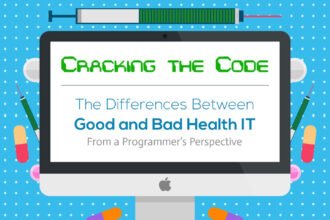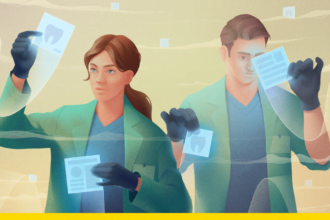New technology used to be the star of the annual Computer Electronics Show, but that event has recently lost a lot of its glitter. FutureMed may be taking its place in the realm of mobile health, commonly referred to as mHealth. David Shaywitz, who writes for Forbes Magazine, attended FutureMed and his article, “Medicine’s Tech Future – the View from the Valley,” describes the
New technology used to be the star of the annual Computer Electronics Show, but that event has recently lost a lot of its glitter. FutureMed may be taking its place in the realm of mobile health, commonly referred to as mHealth. David Shaywitz, who writes for Forbes Magazine, attended FutureMed and his article, “Medicine’s Tech Future – the View from the Valley,” describes the “three sequential reactions” he had which he compares to Haeckel’s Law, something Shaywitz says is “ontogeny recapitulates phylogeny.” (I admit I had to look this up, so let me save you the time. This is the way the theory of recapitulation is often expressed. This disproven biological hypothesis posits that in developing from embryo to adult, animals go through stages resembling or representing successive steps in the evolution of their remote ancestors.) In other words, Shaywitz is saying that each of his responses seems to reflect a distinct stage of professional development.
His initial reaction? “Technology is wicked cool, and will deliver us all.” He was taken with all the new technologies and approaches that sound like science fiction but could be inevitable.
Second reaction? A more reasoned impression: “A celebration of technology for its own sake.” He notes the “huge gap” between the limited understanding of medical problems by innovators and those that physicians and patients experience. He wonders if technology innovators even consider solving actual problems. GlobalMed learned that talking to doctors about what they want to see and where they want to see it helped us develop telemedicine delivery systems that fit physicians’ needs. (Are there really 15,000 medical apps on sale at iTunes?!?!)
His third reaction? Despite the disparity between innovation and actual use, he believes that “a critical mass of people” is converging. “The worlds,” he says, ”may be getting closer.” Telemedicine technology is already bringing the world close.
But mobile medical technology is no longer escaping scrutiny. The FDA has made it clear that it wants to decide the value of some of the new technology, including apps, and whether they can be used in medicine.
The FDA is now proposing guidelines for the medical apps it will oversee: “computer and/or software components or applications” that meet the FDA definition of a “device” – an “instrument, apparatus, implement, machine, contrivance, implant, in vitro reagent that is intended for use in the diagnosis of disease or other conditions, or in the cure, mitigation, treatment or prevention of disease.” The focus will be on a subset of mobile apps that either have traditionally been considered medical devices or affect the performance or functionality of a currently regulated medical device.
The FDA guidelines are a signal to developers and the medical community to proceed with caution. Just because the app works on an iPhone doesn’t mean doctors should begin using it in patient care. If a new app qualifies as a “medical device,” it may never make it to market because getting FDA approval can drag on and on and costs money upfront.







